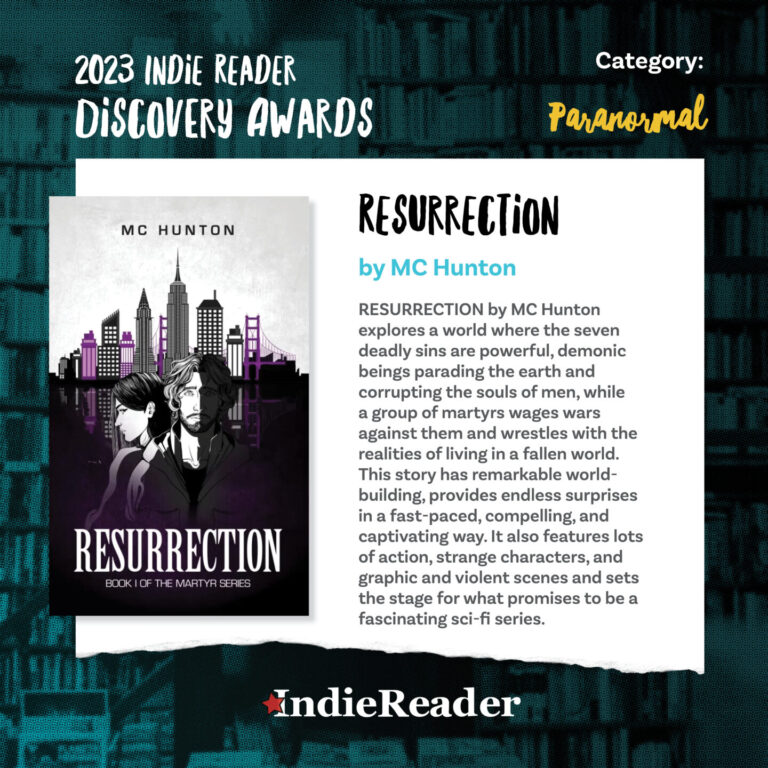Resurrection was the winner in the Paranormal category of the 2023 IndieReader Discovery Awards, where undiscovered talent meets people with the power to make a difference.
Following find an interview with author MC Hunton.
What is the name of the book and when was it published?
The book is titled Resurrection, and it was first published on July 17, 2021.
What’s the book’s first line?
“DO NOT CROSS.”
What’s the book about? Give us the “pitch”.
The Seven Deadly Sins are more than just a fable. They’re hell, and they’re here on earth.
This intense, Urban fantasy book blends the supernatural and magical realism with a dark, dystopian alternate future, where an ancient evil has been slowly corrupting mankind since the dawn of time.
The Martyrs, an underground resistance group, is all that stands between the Sins and complete control, waging a losing battle with no end in sight…
Until Darius Jones joins the fight.
What inspired you to write the book? A particular person? An event?
I’ve always been passionate about stories that blend the supernatural with the world we’re all familiar with. I first fell in love with this mixture of concepts when I read Philip Pullman’s “The Golden Compass” as a child, and my passion snowballed from there. Resurrection is a blend of a lot of things that inspire me, from socioeconomic struggles, systemic corruption, religious control, and emotional intelligence and strength.
What’s the most distinctive thing about the main character? Who-real or fictional-would you say the character reminds you of?
My main character follows a lot of the same tropes in the “reluctant hero” category, but I wanted to make him stand out by kind of “gender bending” the expectations. Of the two protagonists, the female character is the emotionally volatile and physically adept lone wolf, while the male protagonist is emotionally intelligent, community-focused, and more of a healer than a fighter.
What’s the main reason someone should really read this book?
If you love a gripping story with enthralling characters, intense action, and a unique storyline that blends the supernatural with the real world, this book is for you. Bonus points if you enjoy thought-out series that follow an overarching storyline that flows seamlessly from one book to the next.
When did you first decide to become an author?
I started writing as a child, but I really dedicated myself to being an author when I was fifteen and the first iteration of Resurrection came to life. I went on to study creative writing and have been involved in workshop groups ever since.
Is this the first you’ve written?
This is my debut novel, but the final, published work is the fourth complete rewrite of the book.
What do you do for work when you’re not writing?
I actually recently jumped into writing and publishing full-time, exiting a marketing and business consulting company I helped found in 2012 in January of this year to dedicate myself to this series and other projects!
How much time do you generally spend on your writing?
It depends. Not a day goes by where I don’t touch my work somehow, whether that’s simply revising, rereading, or planning. Writing is so much more than sitting down and getting words on the page. I would say I spend at least 2-3 hours every single day working specifically on the writing part of publishing, and the rest is dedicated to promotion, outreach, social media, and other business elements.
What’s the best and the hardest part of being an indie?
The best part about being an indie author is knowing that I have full creative control of anything that happens with this series. It’s all in my hands, from conception to publication, and that’s liberating and empowering. It’s also very isolating. The hardest part of being an indie author is that it all comes down to me. I don’t have a huge team behind me, but the team I do have is passionate as hell, and I wouldn’t be where I am today without them.
Would you go traditional if a publisher came calling? If so, why?
It depends on the publishing deal that was being offered. Traditional and Indie publishing always seem to be at odds, but it doesn’t need to be that way. They are just two different parts of the same industry, and every author’s unique journey is just as valid as the next, whether they traditionally publish or independently publish. If a traditional publisher wanted to pick up my series but I still got to maintain a high level of creative control and ownership, I would definitely consider it. Traditional publishers have access to a lot of amazing resources and connections that are more challenging for me to tap into as an indie author.
Is there something in particular that motivates you (fame? fortune?)
One of the reasons I went Indie over Traditional publishing was because I just wanted to share my story. I love my books, I LOVE my characters, and I didn’t want other people to decide if the world deserved to see them or not. I guess you could say I’m motivated by a deep love for the work I do and a desire to see that work in other people’s hands. Nothing lights my fire more than hearing about other people enjoying my work.

